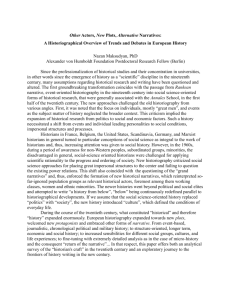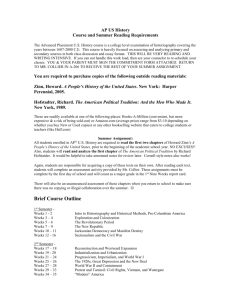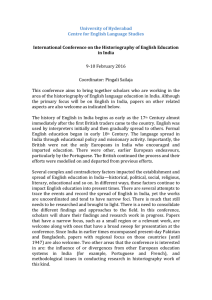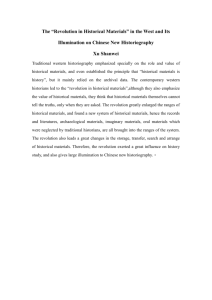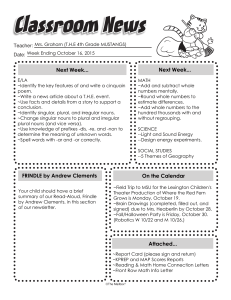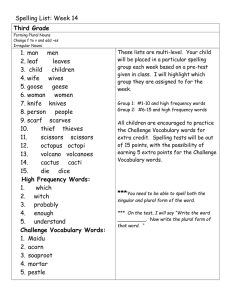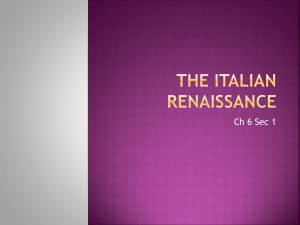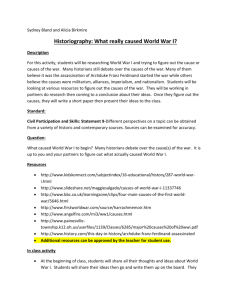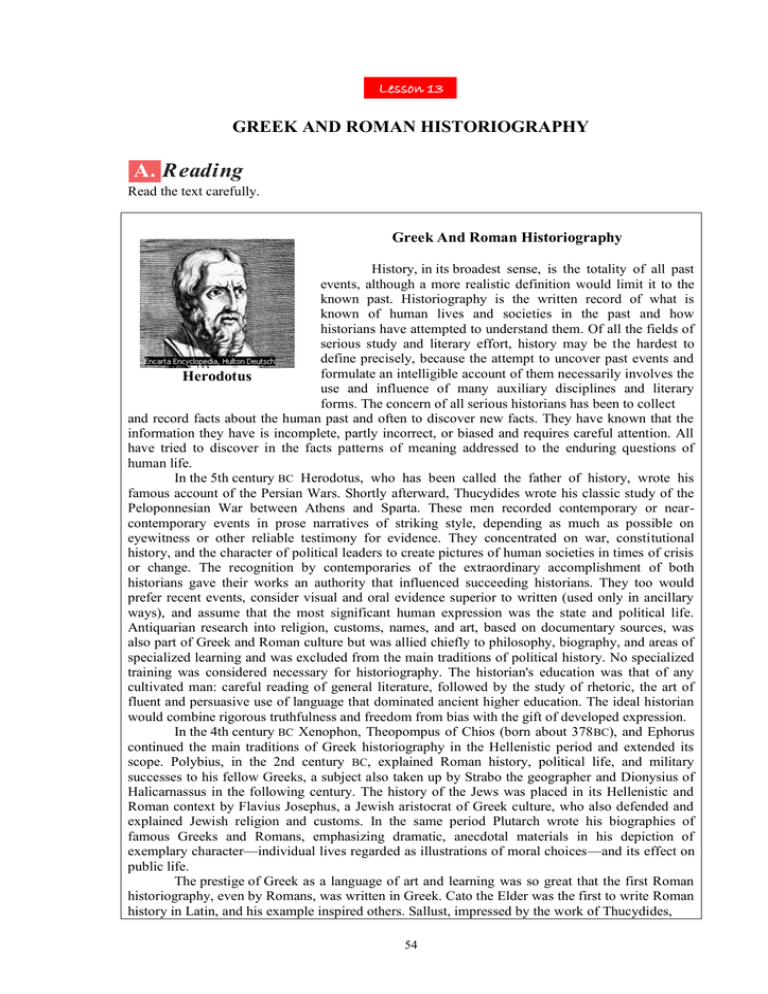
Lesson 13
GREEK AND ROMAN HISTORIOGRAPHY
A. Reading
Read the text carefully.
Greek And Roman Historiography
History, in its broadest sense, is the totality of all past
events, although a more realistic definition would limit it to the
known past. Historiography is the written record of what is
known of human lives and societies in the past and how
historians have attempted to understand them. Of all the fields of
serious study and literary effort, history may be the hardest to
define precisely, because the attempt to uncover past events and
formulate an intelligible account of them necessarily involves the
Herodotus
use and influence of many auxiliary disciplines and literary
forms. The concern of all serious historians has been to collect
and record facts about the human past and often to discover new facts. They have known that the
information they have is incomplete, partly incorrect, or biased and requires careful attention. All
have tried to discover in the facts patterns of meaning addressed to the enduring questions of
human life.
In the 5th century BC Herodotus, who has been called the father of history, wrote his
famous account of the Persian Wars. Shortly afterward, Thucydides wrote his classic study of the
Peloponnesian War between Athens and Sparta. These men recorded contemporary or nearcontemporary events in prose narratives of striking style, depending as much as possible on
eyewitness or other reliable testimony for evidence. They concentrated on war, constitutional
history, and the character of political leaders to create pictures of human societies in times of crisis
or change. The recognition by contemporaries of the extraordinary accomplishment of both
historians gave their works an authority that influenced succeeding historians. They too would
prefer recent events, consider visual and oral evidence superior to written (used only in ancillary
ways), and assume that the most significant human expression was the state and political life.
Antiquarian research into religion, customs, names, and art, based on documentary sources, was
also part of Greek and Roman culture but was allied chiefly to philosophy, biography, and areas of
specialized learning and was excluded from the main traditions of political history. No specialized
training was considered necessary for historiography. The historian's education was that of any
cultivated man: careful reading of general literature, followed by the study of rhetoric, the art of
fluent and persuasive use of language that dominated ancient higher education. The ideal historian
would combine rigorous truthfulness and freedom from bias with the gift of developed expression.
In the 4th century BC Xenophon, Theopompus of Chios (born about 378 BC), and Ephorus
continued the main traditions of Greek historiography in the Hellenistic period and extended its
scope. Polybius, in the 2nd century BC, explained Roman history, political life, and military
successes to his fellow Greeks, a subject also taken up by Strabo the geographer and Dionysius of
Halicarnassus in the following century. The history of the Jews was placed in its Hellenistic and
Roman context by Flavius Josephus, a Jewish aristocrat of Greek culture, who also defended and
explained Jewish religion and customs. In the same period Plutarch wrote his biographies of
famous Greeks and Romans, emphasizing dramatic, anecdotal materials in his depiction of
exemplary character—individual lives regarded as illustrations of moral choices—and its effect on
public life.
The prestige of Greek as a language of art and learning was so great that the first Roman
historiography, even by Romans, was written in Greek. Cato the Elder was the first to write Roman
history in Latin, and his example inspired others. Sallust, impressed by the work of Thucydides,
54
Greek and Roman Historiography 55
developed a brilliant Latin style that combined ethical
reflections with acute psychological insight. His political
analysis, based on human motivation, was to have a long
and pervasive influence on historical writing. At the same
time, Cicero, although not himself a historian, defined the
prevailing ideals of historiography in terms of stylistic
elegance and traditional moral standards applied to the
events of public life. Latin historical writing continued in
this mode with Livy, Tacitus, and Suetonius.
Cato the Alder
Contributed By:
Nancy F. Partner
Microsoft ® Encarta ® Reference Library 2005. © 1993-2004 Microsoft Corporation. All rights reserved.
Exercise
Answer the questions based on the text above.
1.
2.
3.
4.
5.
6.
7.
8.
What are the important of history and historiography?
Why did people call Herodotus as the father of history?
Who is Thucydides?
What are the main traditions of Greek historiography in the Hellenistic period?
What are the differences between the Greek and Roman Historiography?
Who is Cato the Elder?
How did Latin historical writing develop?
Is it true that Greek and Roman historiography emphasised in political history?
B. Vocabulary
Singular and Plural Nouns
Plural
Regular
Singular
For most words, simply a
final –s is added to form the
plural
song, hat, book, hand, bag,
etc.
songs, hats, books, hands,
bags, etc.
Final –es is added to words
that end in –sh, -ch, -s, -z, -x
dish, watch, class, buzz, box,
etc
dishes, watches, classes,
buzzes, boxes, etc
toy, boy, etc
toys, boys, etc
baby, lullaby, etc
babies, lullabies, etc
echo, hero, potato, etc
echoes, heroes, potatoes, etc
auto, video, radio, etc
autos, videos, radios, etc
volcano, zero, tornado, etc
volcanoes/volcanos,
zeroes/zeros, tornadoes /
tornados, etc
For words that end in –y
If –y is preceded by a vowel,
only –s is added
If –y is preceded by a
consonant, the –y is changed
into –i and –es is added
Some nouns that end in –o,
final –es is added to form the
plural
Some nouns that end in –o,
final –es is added to form the
plural
Some nouns that end in –o,
either final –s or–es can be
added to form the plural
Greek and Roman Historiography 56
Some nouns that end in –f,
simply final –s is added to
form the plural
Some nouns that end in –f or fe, final –ves is added to form
the plural
belief, chief, roof, etc
beliefs, chiefs, roofs, etc
half, leaf, knife, life, etc
halves, leaves, knives, lives,
etc
Some nouns have the same
singular and plural forms
deer, fish, series, sheep,
species, etc
deer, fish, series, sheep,
species, etc
Irregular
Singular
Plural
The noun have irregular plural
forms
man, woman, child,
mouse, foot, goose, etc
Some nouns that English has
borrowed from other
languages have foreign
plurals
criterion, cactus, vertebra,
analysis, index, bacterium,
datum, etc
ox,
men, women, children, oxen,
mice, feet, geese, etc
criteria, cacti/cactuses,
vertebrae, analyses,
indices/indexes, bacteria,
datum/data, etc
Exercise
Write the plural forms of these words and make a sentence for each word!
1.
2.
3.
4.
5.
6.
7.
8.
9.
10.
rug
photo
syllabus
cake
medium
monkey
tax
ring
phenomenon
fox
11.
12.
13.
14.
15.
16.
17.
18.
19.
20.
sandwich
crisis
shelf
mango
thesis
tooth
memorandum
course
piano
river
C. Grammar
Modal Auxiliaries
1. May
a. Permission
may has the same meaning with be allowed to
Example: You may go home now
You are allowed to go home now.
May I borrow your book?
Am I allowed to borrow your book?
b. Possibility
may has the same meaning with perhaps or it is possible that
The train is not coming yet now. He may come late
Perhaps, he come late
It is possible that he come late.
Note: might has the same meaning with may, but might is quite formal and polite
Greek and Roman Historiography 57
2. Can
a. Permission
Can has the same meaning with be allowed to or be permitted to
Example: Can I borrow your pen?
Am I allowed to borrow your pen?
Am I permitted to borrow your pen?
b. Capability
Can has the same meaning with be able to.
Example: I can to do it.
I am able to do it.
c. Sometimes
Can be has the same meaning with sometimes
Example: He can be very stubborn.
He is sometimes very stubborn.
Note: could has the same meaning with can, but could is quite formal and polite
3. Must
a. Obligation
Must has the same meaning with have to.
Example: She must leave this class now.
She has to leave this class now.
b. Probability
Must be has the same meaning with is is very probable that.
Example: He left the school an hour ago. He must be at home now.
It is very probable that he is at home now.
4. Should
a. Obligation
Should has the same meaning with ought to
Example: The exam comes nearer. So, you should study harder.
you ought to study harder.
b. Advice
Example: You should eat a lot of vegetables
c. Expectation
Example: The teacher explain the lesson carefully. The student should understand it.
d. Probability
Example: Because it is raining heavily, he should be late.
5. Will
Future time
Will has the same meaning with be going to.
Example: We will go to the dentist tomorrow.
We are going to go to the dentist tomorrow.
Life can only be understood backwards, but it must be lived forwards.
Greek and Roman Historiography 58
C. Grammar
Exercise
Fill in the blank with appropriate words.
Example: It looks like rain. We (close) _________________ the windows and the doors.
It looks like rain. We should close the windows and the doors.
1. You (answer) _________________ the call. It (be) _________________ important.
2. Sally is looking at the test paper the teacher just returned. She looks like sad. She (pass, not)
_________________ the test.
3. Sorry, I didn’t understand. (Repeat, you) ______________________ what you said?
4. When I was younger, I (run) _________________ ten miles without stopping. But now I (run,
not) _________________ more than a mile or two.
5. It’s not look like Rossy to be late. She (be) _________________ here an hour ago. I hope
nothing bad happened.
6. A: Where are you going?
B: I (go) _________________ to the library. I (find) _________________ any books about
History of Indonesia.
7. Microwave ovens make cooking fast and easy. If you have one, you (cook) _____________
this noodle in three minutes.
8. The teacher called on Sam in class yesterday, but he kept looking out the window and didn’t
respond. He (daydream) _________________
9. You (clean) __________________ this room before your mother gets home. She’ll be angry if
she sees all this stuff all over the floor.
10. I returned a book to the library yesterday. It was two days overdue, so I (pay) ____________ a
fine of Rp. 1000,-


